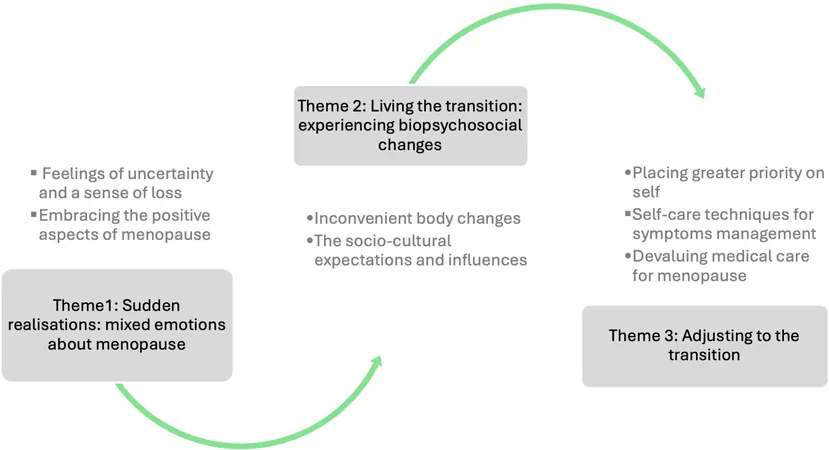
Understanding Menopause: Insights from Women in Saudi Arabia
2024-11-25
Author: Wei Ling
Study Overview
In an insightful qualitative study conducted in Saudi Arabia, researchers explored the knowledge, attitudes, and personal experiences of 29 middle-aged women regarding menopause. This research was designed to gather nuanced insights on a subject often shrouded in cultural sensitivities, utilizing a social constructivism framework to understand individual experiences within the sociocultural context.
Methodology
Participants, aged 40 to 64, engaged in semi-structured online interviews that allowed for intimate discussions about various aspects of menopause. This method was preferred over focus groups to ensure a comfortable space for participants to express sensitive topics, including bodily changes, emotional wellbeing, and societal expectations. Women from diverse backgrounds and health statuses were included, allowing for a comprehensive understanding of their menopause journey.
Recruitment and Participant Diversity
The recruitment process spanned 16 weeks and involved outreach through social media platforms like WhatsApp and Instagram, as well as traditional methods, such as flyers in public places. This approach aimed to bridge the digital divide and cater to women with varying levels of technological access. A total of 29 women successfully participated, representing different educational backgrounds, marital statuses, and menopausal stages (premenopausal, perimenopausal, and post-menopausal).
Key Findings
Three major themes emerged from the discussions: 1. **Mixed Emotions Toward Menopause**: Women expressed a blend of emotions, ranging from uncertainty and feelings of loss to relief and acceptance. While many acknowledged menopause as a natural phase, those experiencing sudden menopause due to medical conditions felt heightened anxiety and fear. 2. **Experiencing Biopsychosocial Changes**: Participants reported a range of physical and emotional symptoms, including hot flashes, insomnia, and anxiety. Many shared that societal stigma and cultural taboos surrounding menopause contributed to feelings of isolation, making conversations about their experiences difficult, especially with family and partners. 3. **Adjustment Strategies**: Women prioritized self-care, engaging in activities that enhanced their well-being, such as exercise and dietary adjustments. Many avoided medical consultations, citing the lack of perceived need or fears surrounding hormone replacement therapy (HRT). However, there was a strong inclination toward self-management approaches to alleviate discomfort.
Cultural Context and Implications
The cultural context heavily influences perceptions of menopause among Saudi women. Traditional beliefs often hinder open discussions about menopause, leading many to seek information discreetly online. The study highlights a profound necessity for enhanced educational resources regarding menopause, particularly in Arabic, and the establishment of supportive online communities.
Conclusions and Recommendations
This research illuminates the need for healthcare providers to proactively address menopause in consultations, providing clear information about symptoms and available management strategies. Establishing dedicated menopause clinics could empower women to take control of their health during this transitional phase. Overall, fostering open dialogues surrounding menopause within families and communities is essential for improving the quality of life for women experiencing this natural life stage. As conversations about menopause expand, women can embrace this phase with a sense of community, support, and empowerment—shifting perceptions from secrecy and stigma to understanding and acceptance.



 Brasil (PT)
Brasil (PT)
 Canada (EN)
Canada (EN)
 Chile (ES)
Chile (ES)
 España (ES)
España (ES)
 France (FR)
France (FR)
 Hong Kong (EN)
Hong Kong (EN)
 Italia (IT)
Italia (IT)
 日本 (JA)
日本 (JA)
 Magyarország (HU)
Magyarország (HU)
 Norge (NO)
Norge (NO)
 Polska (PL)
Polska (PL)
 Schweiz (DE)
Schweiz (DE)
 Singapore (EN)
Singapore (EN)
 Sverige (SV)
Sverige (SV)
 Suomi (FI)
Suomi (FI)
 Türkiye (TR)
Türkiye (TR)